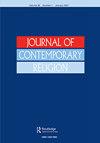Religion in Rebellions, Revolutions, and Social Movements
IF 0.6
3区 哲学
0 RELIGION
引用次数: 0
Abstract
the authors reflect plurality. Thus, this collection is characterised by contributions from scholars with different religious backgrounds and from different countries. The different methods and approaches of the projects refer to current developments in the respective countries and consider different facets of religious diversity. The significant contribution of the third part is the overview of Islamic religious education in different countries. In addition, the presentation of the wider social context of the respective countries in most of the chapters allows for a good understanding of both the opportunities and the challenges of Islamic religious education. For comparability between the countries, it would be helpful for readers if the chapters had similar structures. In general, the contributions stand unrelated to each other in this volume. A different structure or a bundling of the individual contributions by the editors could have made for more internal consistency of the book. However, this does not diminish the great merit of the editors to have collected diverse contributions on religious plurality. The range of chapters provides a rich source of information on perspectives and research projects of authors from different countries. Overall, this edited volume offers interesting insights into religious diversity with a clear focus on Islam and Islamic religious education and is recommended to anyone concerned with Islamic religious education.叛乱、革命和社会运动中的宗教
作者反映了多元性。因此,这本文集的特点是来自不同宗教背景和不同国家的学者的贡献。项目的不同方法和方法参考了各自国家的当前发展,并考虑到宗教多样性的不同方面。第三部分是对不同国家伊斯兰宗教教育的概述。此外,在大多数章节中介绍了各自国家更广泛的社会背景,有助于更好地了解伊斯兰宗教教育的机遇和挑战。对于各国之间的可比性,如果各章的结构相似,对读者会有所帮助。总的来说,本卷中的贡献互不相关。不同的结构或编辑对个人贡献的捆绑本可以使本书更加内部一致。然而,这并没有削弱编辑们收集关于宗教多元化的各种贡献的巨大功绩。这一系列章节提供了关于不同国家作者的观点和研究项目的丰富信息来源。总的来说,这本经过编辑的书对宗教多样性提供了有趣的见解,明确关注伊斯兰教和伊斯兰宗教教育,并推荐给任何关注伊斯兰宗教教育的人。
本文章由计算机程序翻译,如有差异,请以英文原文为准。
求助全文
约1分钟内获得全文
求助全文
来源期刊

Journal of Contemporary Religion
RELIGION-
CiteScore
1.20
自引率
0.00%
发文量
59
期刊介绍:
Journal of Contemporary Religion is an international peer reviewed journal. Its purpose is to both document and evaluate the anthropological, sociological, psychological, and philosophical aspects of emerging manifestations of religiosity in any part of the world—whether within innovative movements or mainstream institutions. The term ''religion'' in the title of this journal is understood to include contributions on spirituality. Moreover, as the journal title suggests, the focus is on contemporary issues. Therefore, the editors of Journal of Contemporary Religion welcome submissions which deal with: classical topics in the study of religion, such as secularisation and the vitality of religion or traditional sectarian movements; more recent developments in the study of religion, including religion and social problems, religion and the environment, religion and education, the transmission of religion, the materialisation and visualisation of religion in various forms, new forms of religious pluralism, the rise of new forms of religion and spirituality, religion and the Internet, religion and science, religion and globalisation, religion and the economy, etc. theoretical approaches to the study of religion; discussions of methods in relation to empirical research; qualitative and quantitative research and related issues. The Journal includes reviews of books which reflect the above themes.
 求助内容:
求助内容: 应助结果提醒方式:
应助结果提醒方式:


